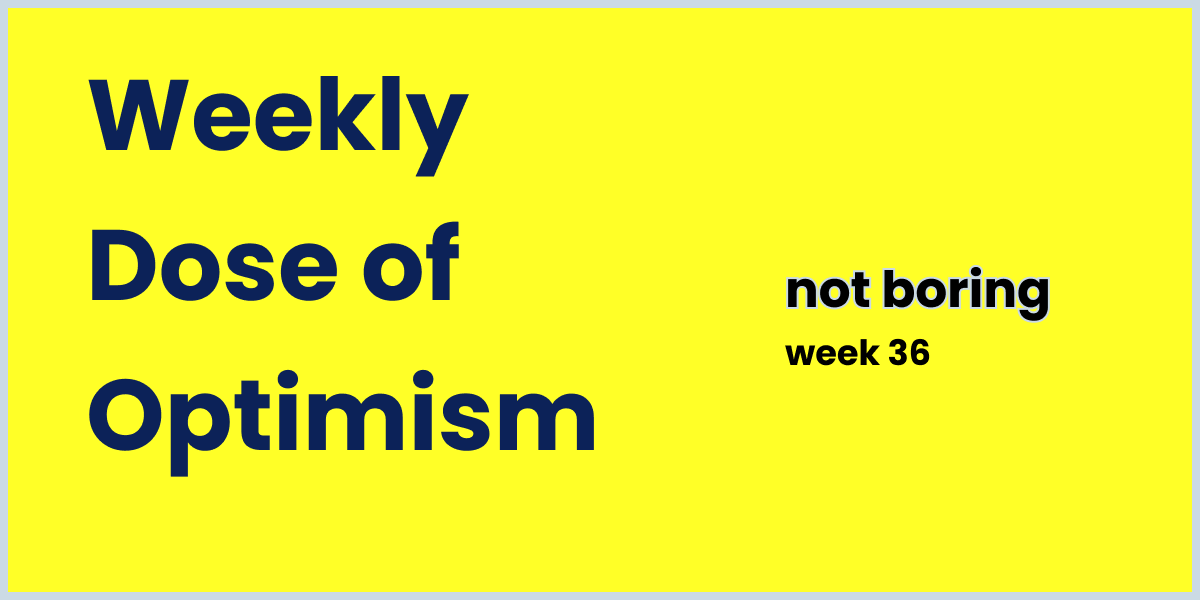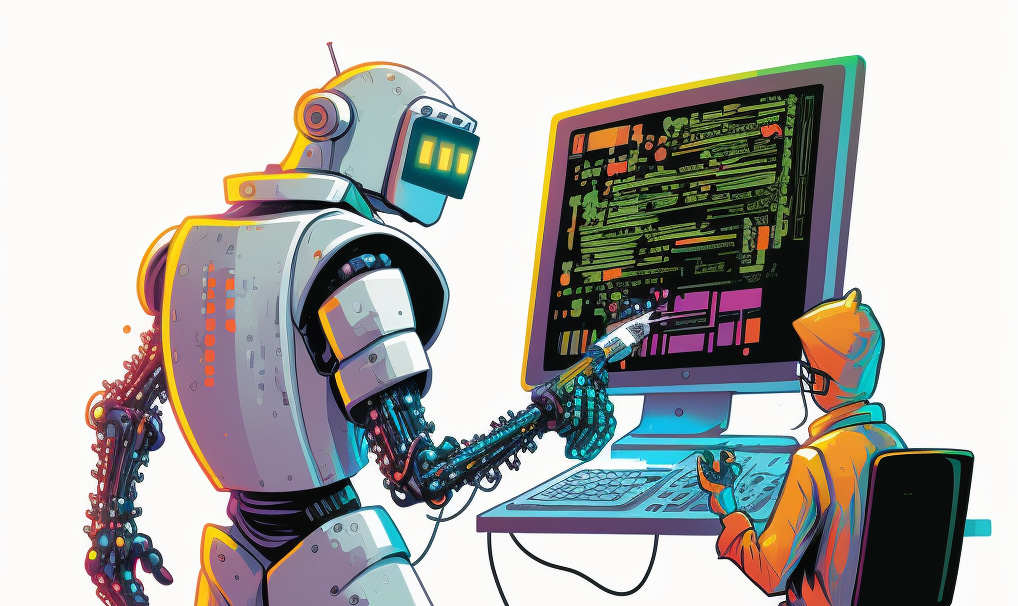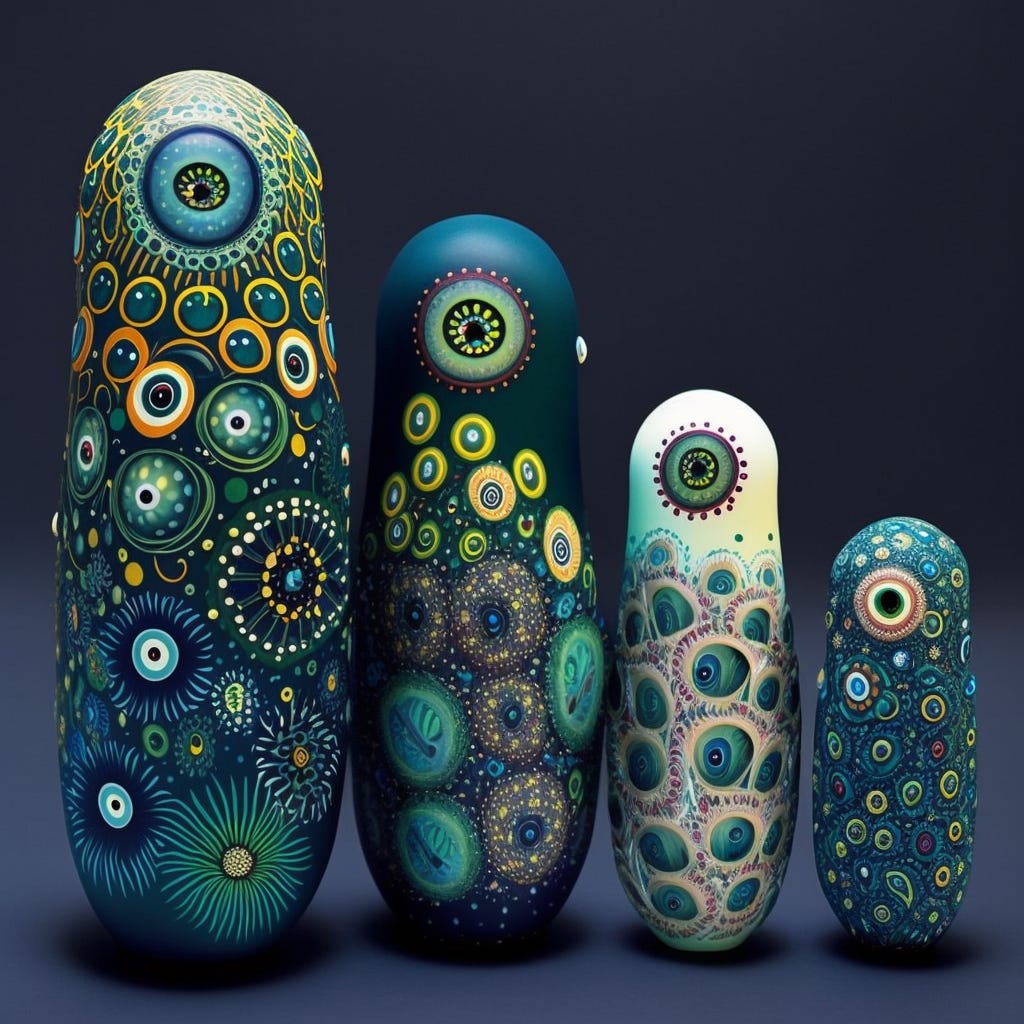Not Boring by Packy McCormick - Weekly Dose of Optimism #36
Weekly Dose of Optimism #36Possible, Malleable Software, Taking the Plunge, Age of Average, Genetic DesignHi friends 👋, Happy Friday and welcome back to our 36th Weekly Dose of Optimism. It’s hard to write a post on optimism the week of another school shooting, this time in Nashville. It’s embarrassing, sad, and pathetic that this keeps happening in America, and that it doesn’t seem like anyone’s willing to do anything about it. Our hearts go out to the victims and their families. Despite the tragedy, humans did do some pretty amazing things this week, and it’s our job here to try to balance the bad news that streams constantly on the news and your social feeds with the many more good things happening out there. Let’s get to it. The Weekly Dose is brought to you by... Create Create is reversing the creatine stigma with its first-of-its-kind creatine monohydrate gummy. Readers of the Weekly Dose may not know this, but I (Dan) founded and operate Create. Creatine and newsletters…I couldn’t have predicted this career. But why creatine? 5 Reasons:
In just the last 3 months, over 5,000 customers have added our first-of-its-kind creatine monohydrate gummy to their daily routine and 90% of subscribers report that they “look forward to taking their creatine gummies each day.” As a Not Boring reader, you can get 20% off your order with code notboring20. (1) Possible From Reid Hoffman and Aria Finger
We’re not alone in our quest to spread optimism. Reid Hoffman, along with co-host Aria Finger, launched a new podcast with a twist. Each episode, they explore the brightest version of the future of a specific topic — so far entertainment, fusion, and clean energy. The twist is that after exploring this future with a guest, they also prompt ChatGPT to explore that bright future as well…and compare how the two match up. ✅ Reid Hoffman podcast (big Masters of Scale fans) ✅ Optimistic storytelling and exploration ✅ Working in ChatGPT into the podcast about the future of entertainment, very meta! In the episode linked above, Trevor Noah shared his perspective on the relationship between technology and optimism, saying, “In order to be a technologist, you have to be an optimist because you have to believe the future you’re designing for will exist or you have to believe that what you’re creating will contribute to that future.” Amen Trevor. (2) Malleable software in the age of LLMs From Geoffrey Litt
Litt explores the implications of LLM on the democratization of software creation. What happens when everyone, with a little bit (OK, a lot of bit) of help from their friendly LLM assistant, can write code? As Litt views it, a more democratic digital landscape in which end-users create and control software that fit their specific needs. LLMs help 'Liberate the Last Mile,” or the final leg that would-be developers need to traverse to execute code. Us normies have all been there — we have a great idea, maybe even have a bit of technical chops, but can’t bridge the gap between insights and actually deploying a useful piece of software. Essentially, writing and executing code from end-to-end is a lot more complex than it looks, and LLMs represent a step-change in a normal person’s ability to do so. As someone who is deeply fascinated by tech, but can’t really code (any often gets caught up in the Last Mile when I try), this is a super exciting vision. For top professional developers, I don’t anticipate LLMs will make them obsolete, but instead allow them to focus on more and more complex problems. (3) Existential risk, AI, and the inevitable turn in human history Tyler Cowen for Marginal Revolution
This was a big week for the AI safety debate, kicked off by this Marginal Revolution post by Tyler Cowen, followed by an open letter calling for a 6-month pause to “giant AI experiments” signed by Elon Musk, Steve Wozniak, Max Tegmark, and others, and capped off by an even more extreme call to “shut it all down” by Eliezer Yudkowsky in Time. How AI is going to impact society — from how it will impact jobs and meaning to whether it’s going to kill us all — is an important conversation, and even the AI optimists believe it’s one we should be having. Sam Altman talked about it on Lex Fridman and Nat Friedman talked about it on The Lunar Society. When things are moving so fast, and are so uncertain, it’s useful to step back and take the historical perspective, which Cowen did beautifully in his post. He argues that during recent times, most of us have been living in a bubble “outside of history” for two main reasons:
AI represents the end of #2 (and Ukraine/Taiwan may represent the end of #1) and all of a sudden, we’re going to be living inside of “actual ‘moving’ history. It will panic many of us, disorient the rest of us, and cause great upheavals in our fortunes, both good and bad.” Cowen believes that the good will outweigh the bad, but more centrally to the piece, he argues that whatever happens, our previous stasis is going to end anyway and no one — neither the doomers nor the optimists — knows how it’s going to turn out. In his view, the question is no longer “go ahead?” but rather “given that we’re going forward with this, what good can we get out of it?” We can’t change the direction of progress’ arrow; in SlateStarCodex’s words, we are the Puppets and technological progress is “the vastest and most formless Vast Formless Thing of all.” We can only fight to make the positive outcomes vastly outweigh the inevitable negative ones. The closing paragraphs capture our kind of optimism well — of course there will be challenges, but we’re here to overcomes
From Alex Murrell
OK, to be fair, Murrell’s estimation of the world isn’t overly optimistic…but unfortunately, appears to be pretty accurate. The article argues that “creative fields have become dominated and defined by convention and cliché” and this has led to everything looking the same. Airbnbs have the same interior decoration. Coffee shops in Copenhagen and Nashville go for the same vibe. Modern brands, regardless of what they are selling, have the same sans serif copy and playful color scheme. Even models (see above) all adopt the same “Instagram Face.” This is not necessarily a bad thing — places, things, and people conform to what people like or has proven to be successful. Something starts off as new and unique, this attracts attention, and copycats — realizing the best strategy is to copy first, and differentiate later, soon follow. But it does lead to a world, ultimately, in which everything looks the same. There are two ways to view this:
We tend to subscribe to the latter world view. As more creative work is aided by AI, we can envision where the sameness issue gets even worse. That means there will be a growing premium on folks who can produce the different. (5) Accelerating Genetic Design Elliot Hershberg for Century of Biology (Elliot, a Not Boring Bio Partner, provided a short summary of his recent essay below, but the whole essay is worth a read!) Biology is rapidly making the transition from a natural science to an engineering discipline. In large part, this is driven by exponential progress in genetic technologies—specifically DNA sequencing and synthesis. Together, these tools can produce massive data sets that make even the “big data” of the Internet Age look small. This opens the door to building powerful predictive models of biological systems using AI. I refer to this paradigm as the 4-S model, and it’s poised to dramatically change our relationship with our bodies and our planet. The main application of this tool stack so far has been to engineer new types of proteins—which are the molecular machines that make up our bodies. We can rapidly synthesize variations of these molecules and test their behavior using DNA sequencing. This is pretty cool. Engineering new molecules and proteins has produced new cellular receptors that can convince immune cells to cure cancer, and enzymes that power chemical plants that produce no waste. Ultimately, proteins and other molecules are individual parts that are composed into more complex circuits within cells. A longstanding challenge for the field of synthetic biology has been to move up a layer of abstraction and reliably engineer new genetic circuits. This type of progress would unlock a future of programmable medicines and materials, where our medicines—and maybe someday our clothes, buildings, and physical infrastructure—flexibly adapt and compute based on their environment. In this recent essay, I explain exciting new research from a synthetic biology lab at Rice University that aims to accelerate genetic circuit design by leveraging recent advances in DNA sequencing. It’s a great example of the promise at the intersection of genetic engineering and AI. Could we someday produce a ChatGPT that speaks the language of cells? Come for the cool Matroyshka doll art, stay for a primer on AI-driven biodesign. Did you enjoy reading this Weekly Dose of Optimism? (Powered by Sprig) That’s all for this week. We’ll be back in your inbox on Monday. Thanks for reading, Dan |
Older messages
Attention is All You Need
Monday, March 27, 2023
OpenAI's ChatGPT Plugins and the emergence of an Apex Aggregator
Weekly Dose of Optimism #35
Friday, March 24, 2023
Deutsch, Plugins, AI Age, RSV Vaccine, Cowen on the Economy, Succession
The Happiness Hypothesis
Monday, March 20, 2023
Welcome to the 3463 newly Not Boring people who have joined us over the past two weeks! If you haven't subscribed, join 192831 smart, curious folks by subscribing here: Today's Not Boring is
Weekly Dose of Optimism #34
Friday, March 17, 2023
GPT-4, TikTok Ban, Vesuvius Challenge, Varda, Zipline
Weekly Dose of Optimism #33
Friday, March 10, 2023
Superconductor Batteries, US/EU Mineral Alliance, ERC-4337 PaLM-E, Buying Happiness
You Might Also Like
🔮 $320B investments by Meta, Amazon, & Google!
Friday, February 14, 2025
🧠 AI is exploding already!
✍🏼 Why founders are using Playbookz
Friday, February 14, 2025
Busy founders are using Playbookz build ultra profitable personal brands
Is AI going to help or hurt your SEO?
Friday, February 14, 2025
Everyone is talking about how AI is changing SEO, but what you should be asking is how you can change your SEO game with AI. Join me and my team on Tuesday, February 18, for a live webinar where we
Our marketing playbook revealed
Friday, February 14, 2025
Today's Guide to the Marketing Jungle from Social Media Examiner... Presented by social-media-marketing-world-logo It's National Cribbage Day, Reader... Don't get skunked! In today's
Connect one-on-one with programmatic marketing leaders
Friday, February 14, 2025
Enhanced networking at Digiday events
Outsmart Your SaaS Competitors with These SEO Strategies 🚀
Friday, February 14, 2025
SEO Tip #76
Temu and Shein's Dominance Is Over [Roundup]
Friday, February 14, 2025
Hey Reader, Is the removal of the de minimis threshold a win for e-commerce sellers? With Chinese marketplaces like Shein and Temu taking advantage of this threshold, does the removal mean consumers
"Agencies are dying."
Friday, February 14, 2025
What this means for your agency and how to navigate the shift ͏ ͏ ͏ ͏ ͏ ͏ ͏ ͏ ͏ ͏ ͏ ͏ ͏ ͏ ͏ ͏ ͏ ͏ ͏ ͏ ͏ ͏ ͏ ͏ ͏ ͏ ͏ ͏ ͏ ͏ ͏ ͏ ͏ ͏ ͏ ͏ ͏ ͏ ͏ ͏ ͏ ͏ ͏ ͏ ͏ ͏
Is GEO replacing SEO?
Friday, February 14, 2025
Generative Engine Optimization (GEO) is here, and Search Engine Optimization (SEO) is under threat. But what is GEO? What does it involve? And what is in store for businesses that rely on SEO to drive
🌁#87: Why DeepResearch Should Be Your New Hire
Friday, February 14, 2025
– this new agent from OpenAI is mind blowing and – I can't believe I say that – worth $200/month





